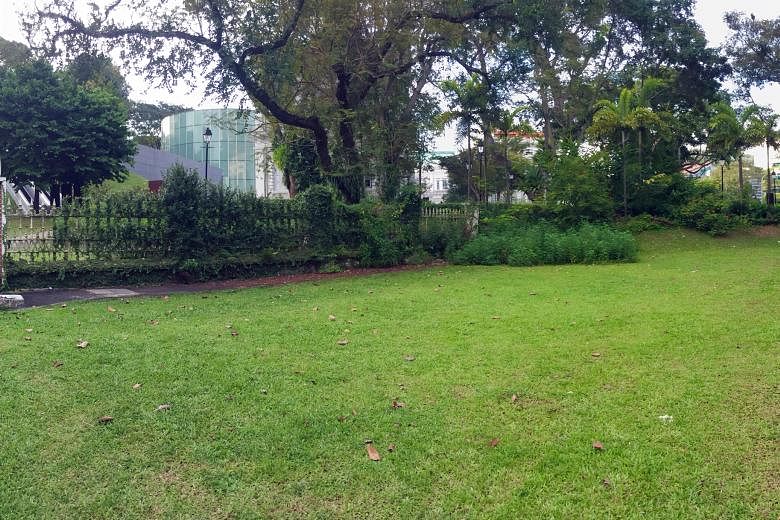The political turmoil in the US makes me want to take refuge under a blanket of nostalgia.
As one thump after another lands on US President Donald Trump's opponents, the anxiety from the chaos makes me miss an alt-reality White House - those noble, smart and funny political characters of noughties TV show The West Wing.
I binge-rewatched the political fantasy about the inner workings of the president's office with Democrat characters who worked with equally dignified Republicans for the good of the country.
In the Emmy award-winning show, America is already great.
Yes, the bogus nature of my nostalgia is clear since The West Wing is a political fairy tale - even if scriptwriters modelled their Latino presidential candidate in part on former president Barack Obama, who was then not yet a senator.
But better this than populists trying to leverage on nostalgia to grab power in real life.

Make (insert country/cause) great again. Make us think that things are much worse now even if reality says the past was not so much better.
According to The Economist, "globally, wars are smaller and less frequent than they were a generation ago. The only type of violence that is growing more common is terrorism, and people wildly overestimate how much of it there is".
And the political consequences?
"Voters who think things were better in the past are more likely to demand that governments turn back the clock.
"A whopping 81 per cent of Donald Trump's supporters think life has grown worse in the past 50 years. Among Britons who voted to leave the European Union, 61 per cent believe that most children will be worse off than their parents. Those who voted against Brexit tend to believe the opposite."
Nostalgia is a sword that can by wielded by either side.
There was a bitter fight against Senator Jeff Sessions being confirmed as President Trump's nominee for attorney-general. (He is now confirmed.) Democratic congressman Luis Gutierrez of Illinois had said that Mr Sessions was the choice of people who had "nostalgia for the days when blacks kept quiet", reported The Guardian.
Nostalgia is a weird bird.
It can make us tweet only sweet things about the past.
Like many, I felt indignant when I read recently about the Agri-Food and Veterinary Authority of Singapore killing free-roaming chickens in Sin Ming after residents squawked about noise last year.
I have seen the birds strutting and clucking by the road, lending a splash of colour and quirkiness to our concrete jungle of Housing Board flats. They reminded me of a childhood when I played with chicks as a kid.
"Ah, those were the days" I could have cooed or whatever.
But a pitfall of nostalgia is how we unconsciously edit out the bad bits, like how the cute fluffballs grew up to be chickens that were slaughtered in front of me.
The knife flashed in the sunlight and blood dripped from the chicken's neck into a bowl, which was then placed in the fridge to be firmed up as a gory sort of pudding.
As a little kid, I stared at the dying chicken in horror. I had dumbly thought they were pets.
How many other memories have we unconsciously edited to keep just the nice bits?
Ah, there used to be bus conductors who clicked tiny holes in paper tickets. I loved those tickets. But sweating in the deafening, hot buses? No thanks.
Buses today are better.
Ah, people were nicer in the past. Maybe they were lovelier to us because we were cute little kids then, not the too-busy-to-talk adults we are now.
Then there is nostalgia tinged with regret: Ah, our old red-brick National Library building which used to be in Stamford Road. I liked sitting on its wide parapet. I liked its unassuming warmth even when compared to the wedding-cake elegance of its neighbour, the National Museum.
The library closed its doors for the last time in 2004, after the Government announced that the building would be demolished for urban redevelopment.
I wonder how powerfully nostalgia would have turned into action if the old library was still around and on the chopping block today.
Residents of two old areas - crayon-coloured kitschy Rochor Centre and retro-cool Dakota Crescent - were asked to move out by the end of last year to make way for urban development. The flats got a lot of love from social media and even an MP.
Last year, The Straits Times reported on how Mr Lim Biow Chuan, MP for Mountbatten SMC, had told Parliament that redevelopment plans for Dakota Crescent should be reconsidered because the estate has architectural, historical and social significance.
Mr Lim, in arguing for key sections of the neighbourhood to be retained, noted that it is one of the first public housing projects developed "to provide mass housing before the role of mass building for the public was passed on to the HDB".
Pragmatism won.
But would the old library building have been saved if today's social media nostalgic power had been added to protests?
That warm and fuzzy feeling of nostalgia can be a hairy thing. Nostalgia can save parts of our urban heritage.
It can even change governments.


